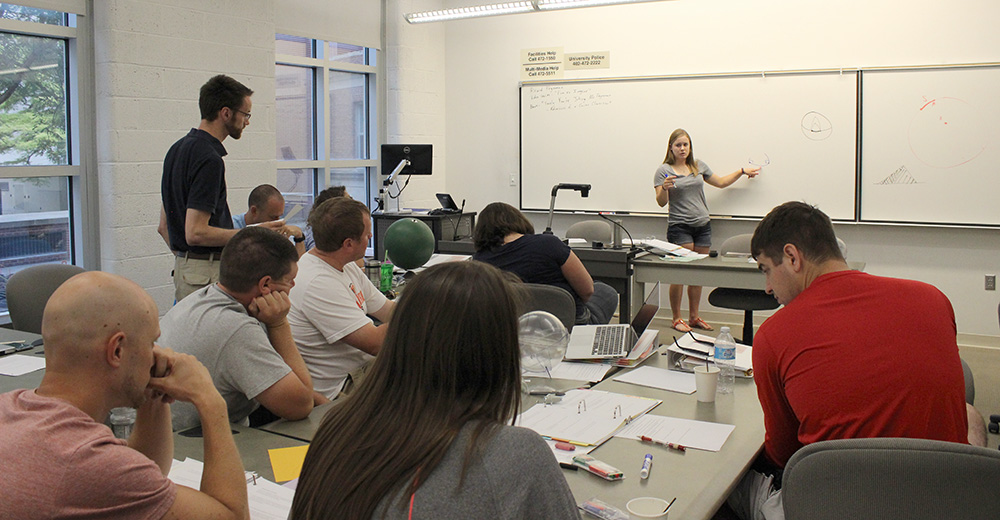
Planning to take a graduate course this summer to continue your professional development or to get one step closer to earning your master’s degree? Do you need additional graduate hours in mathematics or science in order to be eligible to teach dual-enrollment courses at your high school? Registration opens Monday, March 6, for summer courses at UNL. We are offering four new courses in Summer 2017!
(Note to returning students: It's possible that MyRED has assigned you an enrollment date depending on your current status so please take note of that if you are not able to register right away on Monday.)
To enroll in UNL graduate courses, follow the steps outlined on the Nebraska Math and Science Summer Institutes website, http://scimath.unl.edu/nmssi . This year we are offering 30 courses across the state and online to meet your professional development needs. Check out our course catalog, which supplies the needed class numbers for either Teach Nebraska registration or MyRED. The NMSSI Fellowship Application will also open the week of March 13 at http://go.unl.edu/scimathapply
New courses this year, and their primary audiences, are (see course descriptions farther below):
*SOCI 898: Social Psychological Processes in the STEM Classroom: Activating STEM Identities (grades 7-12 math or science teachers)
*TEAC 892: Manipulatives in Mathematics Education (grades K-8 elementary and math teachers)
*TEAC 808E: Improvement of Instruction in School Mathematics – Secondary: Special Topics - Mathematics Curriculum Analysis and Design (grades 7-12 math teachers)
*BIOS 897: Ecology and Evolution of Arachnids for K-12 Educators (grades K-12 science teachers)
For all in-person NMSSI courses, current Nebraska teachers automatically qualify for a tuition fellowship from UNL equal to 20 percent of in-state, graduate tuition. Additionally, Nebraska K-12 teachers can apply for supplemental NMSSI Fellowships to further defray tuition costs for NMSSI courses (funds are limited). See our NMSSI website for details. We expect the application to open during the week of March 13.
Math teachers interested in pursuing a master’s degree now have the option of pursuing a fully online Mathematics Master's program (http://online.unl.edu/programs-and-courses/graduate-doctorate-programs/master-of-arts-teachers.aspx). This option gives teachers a new flexibility to accomplish their education goals. The online MAT program is designed to help teachers strengthen their skills in pedagogy and deepen their knowledge of the mathematics they teach.
Check out the NMSSI website at http://scimath.unl.edu/nmssi/ for updates on course offerings, information about registration, and information about fellowship applications.
COURSE DESCRIPTIONS:
SOCI 898: Social Psychological Processes in the STEM Classroom: Activating STEM Identities
July 10-14 and 17-21, 1 p.m. to 5 p.m. (will appear in MyRED soon; optional: paired with Math 811T: Functions for High School Teachers)
Location: 110 Avery Hall, UNL Campus
Instructor: Trish Wonch Hill, Sociology, UNL
This class covers a broad range of social psychological topics and processes to help teachers better understand how social context impacts STEM learning. Students will learn about social inequality in STEM fields, and the individual, interactional, and institutional barriers to developing a science identity for youth from a variety of social locations (rural/urban, gender, race/ethnicity, Socioeconomic Status, ELL). The class will learn about implicit bias, stereotype threat, and identity theory, and how they impact formal and informal social interactions and learning in the STEM classroom. They will learn and help formulated practical strategies to reduce their negative impact in order to broaden and widen student engagement in STEM.
TEAC 892 - Special Topics: Manipulatives in Mathematics Education
June 19-23, 8 a.m. to 5 p.m. (Class # 4007)
Location: Ashland-Greenwood Public Schools
Instructor: Amanda Thomas, TLTE, UNL
This course is devoted to the role of manipulative materials (both concrete and virtual) in promoting mathematics learning. A philosophy of using manipulatives is developed and integrated with a range of experiences proven effective in helping students learn mathematics. The topics and materials will range from primary to middle grades to secondary mathematics.
TEAC 808E: Improvement of Instruction in School Mathematics – Secondary: Special Topics - Mathematics Curriculum Analysis and Design
June 5-9 and 12-16, 8 a.m. to noon (will appear in MyRED soon; optional: paired with Math 812T: Geometry for Geometry Teachers)
Location: Henzlik Hall, UNL Campus
Instructor: Lorraine Males, TLTE, UNL
This course will focus primarily on the written curricula during significant periods of school mathematics curriculum history. It is designed to help students develop the knowledge, skills, and dispositions useful in the design and analysis of school mathematics curriculum materials. A central feature will be a careful analysis of contemporary written curricula, both standard and innovative, from mathematical content and pedagogical design perspectives and the design of both student and teacher materials.
BIOS 897: Ecology and Evolution of Arachnids for K-12 Educators
July 17-21, 8 a.m. to 5 p.m. (Class # 14960)
Location: 124 Manter Hall, UNL Campus
Instructor: Alissa Anderson, School of Biological Sciences, UNL
This course is for middle school and high school teachers interested in learning how arachnids and their arthropod relatives can be integrated into K-12 classrooms for teaching a breadth of science material including: organismal structure and function; ecosystem interactions and dynamics; inheritance and trait variation; and evolution and biodiversity. The course will use inquiry-based learning, hands on science experiments, individual research projects, and group discussions to learn about the anatomy, physiology, behavior, ecology, and evolution of living arachnid groups.
:::::::::::::::::::::::::
Be a lifelong learner.
Center for Science, Mathematics & Computer Education
http://scimath.unl.edu/nmssi